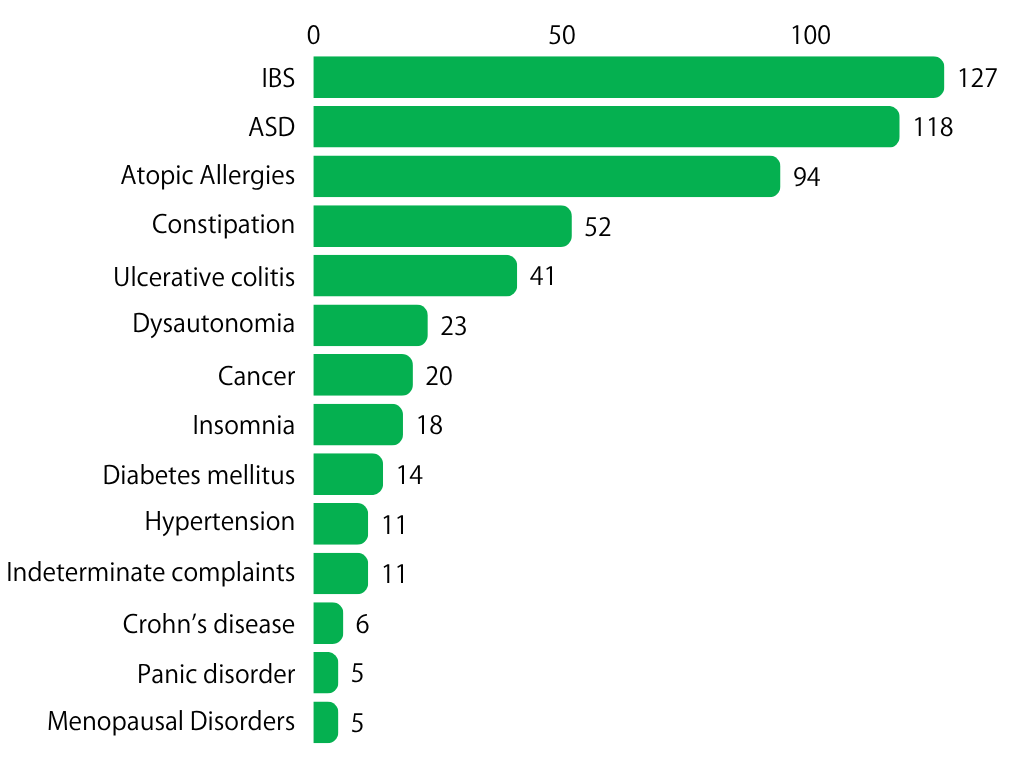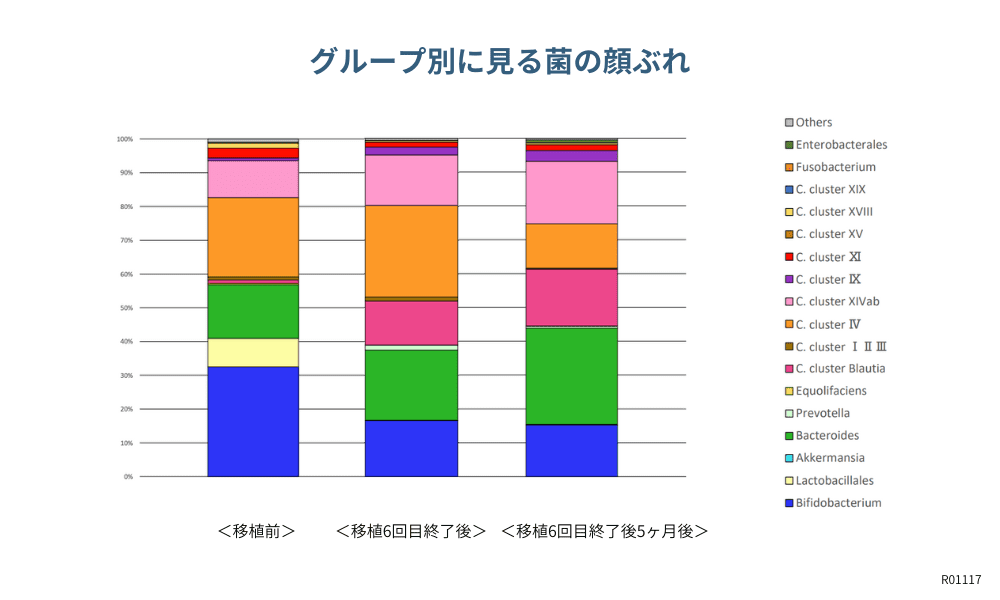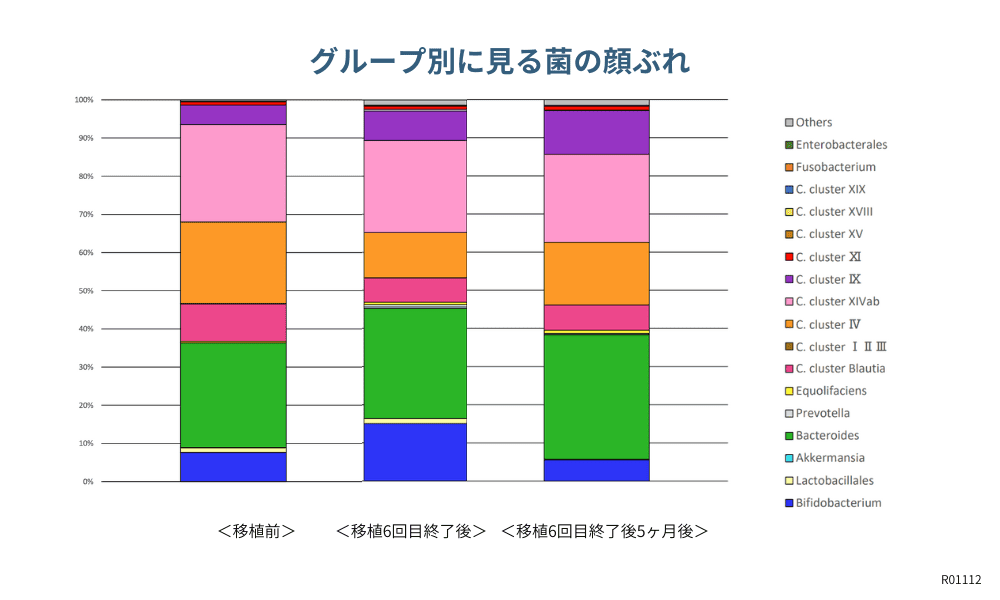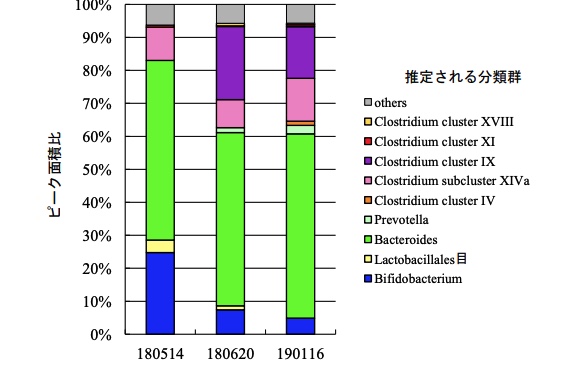Irritable bowel syndrome (diarrhea type), male in his 40s – fecal microbiota transplant case report
Case presentation: Male in his 40s, irritable bowel syndrome (diarrhea type)
summary
In her teens, she was diagnosed with fatty liver; in her 20s, she had chronic diarrhea and gas in her intestines; in her 30s, a colonoscopy revealed colon polyps, which were resected; in her 30s, a colonoscopy revealed inflammation at the end of the ileum.
In April 2018, he underwent a colonoscopy at the Kawauchi Internal Medicine Clinic, which revealed inflammation at the distal end of the ileum; in May, a gastrointestinal endoscopy revealed atrophic gastritis and a positive result for H. pylori, and he underwent eradication treatment. After the transplantation, diarrhea and gas accumulation in the intestine improved.
Basic Information
| Patients:. | 40s Male |
| Attending physician:. | Kawai Internal Medicine Clinic |
| Medical institution in charge of transplantation:. | Kawai Internal Medicine Clinic |
Information at the time of initial medical examination
| Disease name:. | Irritable bowel syndrome (diarrhea type) |
| At onset | mid-20s |
| Transplant Purpose: To | diarrhea |
| Chief complaint:. | Irritable Bowel Syndrome Treatment |
| Medications being taken:. | Nothing |
| Medical history | Colorectal polyps Atrophic gastritis (H. pylori positive) |
| Background, family history, lifestyle, supplement use, etc.:. | Heart disease (mother) |
Transplant Information
| Transplantation period: from | May 22, 2018 – October 30, 2018 |
| Number of transplants | 6 times |
| Change from first transplant to end of transplant:. |
| 【1st transplantation questionnaire】 He was in Vietnam until age 42, but his diarrhea has been getting worse since he returned to Japan. No abdominal pain. Started Mazuren, Glimac, and Biofermin on 5/1 and felt abdominal discomfort and gas decreased, but gas has been accumulating for the past 2 days. 5/8 started Pylori eradication with Bonosap, and diarrhea continued 3 days a week while taking Bonosap. The eradication was completed and the patient has been receiving water for medical assistance since 5/16. 【2nd transplantation questionnaire】 【3rd transplantation questionnaire】 【4th transplantation questionnaire】 【5th transplantation questionnaire】 【6th transplantation questionnaire】 |
| Changes after completion of transplant:. |
| The effect could be felt from about a week after transplantation. |
Evaluation and Discussion
| Transplant Evaluation:. | Moderate improvement of symptoms |
| Pre- and post-transplant flora balance test changes:. | [Before implantation] Performed in May 2018. The flora balance appears to be such that functional dyspepsia is suspected. Although the ratio of bifidobacteria is ideal, there is little diversity of the immune-regulating Clostridium genus. [During transplantation] June 2018. There is a noticeable proliferation of bacteria resistant to medications, probably due to some influence (e.g., medication). There is a good suspicion of the presence of Clostridium spp. etc., which have not yet appeared on the balance sheet and which have been diversified by transplantation. [After transplant] Implemented in December 2018. The diversity of Clostridium genus has improved and the balance is improving. A few more improvements and the start of an increase in lactobacilli and bifidobacteria groups will lead to further improvement of symptoms. |
| Blood test changes:. | [After transplantation] None |
| POMS2 SCORE CHANGE:. | [After transplantation] None |
<Intestinal flora balance before and after transplantation>
| His/her experience (from the questionnaire):. |
| Retrieved June 2018 After the transplant, I felt the effects of the transplant as there was less gas buildup in my intestines. However, as the period of time has passed since the end of the transplant, I feel that I am not feeling it as much. I try to manage my food intake and eat yogurt every day. |
| Adverse events: No |
| Nothing |
| Transplant General Comments and Discussion:. |
| Regarding long-term symptoms, this is a case in which the transplant changed the flora and led to symptom improvement, although the patient was always affected by stress, which is still the base of the disease these days. |
This case was presented at the 3rd Annual Meeting.
その他の Intestinal flora transplantation and case studies に関する記事
Articles about other Intestinal flora transplantation and case studies

November 03, 2025
Fecal microbiota transplantation results *As of September , 2025
The number of actual fecal microbiota transplants by case in our study group is as follows Case reports by disease You can view case reports by disease from the links below: [Ulcerative Colitis]https://fmt-japan.org/research-activities/fmt-cases-index?tag=uc [Irritable Bowel Syndrome]https://fmt-japan.org/research-activities/fmt-cases-index?tag=ibs [Atopic Allergies]https://fmt-japan.org/research-activities/fmt-cases-index?tag=allergy [Constipation]https://fmt-japan.org/research-activities/fmt-cases-index?tag=constipation [ASD (Autism Spectrum Disorder)]https://fmt-japan.org/research-activities/fmt-cases-index?tag=asd [Other Diseases]https://fmt-japan.org/research-activities/fmt-cases-index?tag=others

November 02, 2024
12-year-old girl with autism spectrum disorder -Fecal microbiota transplant case report
Case presentation 12-year-old girl with autistic spectrum disorder summary A case of transplantation for autistic spectrum disorder. Improvement in bowel movements, sleep quality, and tantrums were observed, but not much change was seen in the hyperactivity aspect or impulsivity. Basic Information Patients :12-year-old girlAttending physician :Luke’s Ashiya ClinicMedical institution in charge of transplantation :Luke’s Ashiya […]

November 02, 2024
6-year-old boy with autism spectrum disorder -Fecal microbiota transplant case report
Case presentation 6-year-old boy with autistic spectrum disorder summary A case of transplantation for autism spectrum disorder (ASD). The patient has difficulty in understanding his surroundings and tends to be hyperactive. The main complaint was lack of concentration. No significant change was observed after transplantation. Basic Information Patients :6 year old boyAttending physician :Luke’s Ashiya […]





